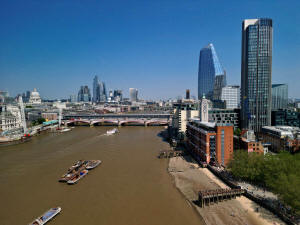UK consumers defy high inflation and shop more in June
 Send a link to a friend
Send a link to a friend
 [July 21, 2023] By
David Milliken [July 21, 2023] By
David Milliken
LONDON (Reuters) -British retail sales grew faster than expected in June
despite continued high inflation, thanks to unusually hot weather and a
rebound in food sales after King Charles' coronation disrupted spending
in May, official figures showed on Friday.
While inflation at nearly 8% - the highest of any large economy -
remains a challenge for many households, some economists say a fall in
energy prices from July 1 will give consumers more disposable income.
Sales volumes in June were 0.7% higher than in May, the Office for
National Statistics (ONS) said, a bigger increase than the 0.2% forecast
by economists in a Reuters poll.
Compared with a year earlier, sales were 1.0% lower, beating forecasts
for a 1.5% decline.
As well as the bounce-back in food sales, department stores and
furniture shops also had a strong month, the ONS said.
During May, households spent less at food retailers, possibly because
they were eating out more at restaurants due to an extra public holiday
to mark King Charles' coronation.
Last month was the hottest June in Britain in modern records, boosting
supermarkets and department stores. Only clothing and footwear stores
saw lower sales last month.
Sterling jumped by around a quarter of a cent against the U.S. dollar
after the data before giving up its gains.
SPENDING UP, CONSUMPTION STAGNANT
The longer term picture is less rosy, however, as shoppers are getting
much less for their money than three years ago and overall consumption
has stagnated along with the economy.
Market research firm GfK reported that consumer confidence fell in July
for the first time since January.

[to top of second column] |

A drone view of the City of London and
St Paul's cathedral, as temperatures hit 30 degrees centigradeas the
British capital sweltered in the hottest day of the year, June 10,
2023. REUTERS/Yann Tessier

While the amount of money spent at retailers last month was 17.9%
higher than just before the COVID-19 pandemic, the volume of goods
bought was 0.2% lower, the ONS said.
Food inflation has been especially high, with prices in June 17.4%
above those a year earlier, not much below March's 45-year high of
19.2%, according to ONS data published on Wednesday.
Britain's competition regulator said on Thursday that high prices
were not due to weak competition between supermarkets, after
allegations of profiteering.
Friday's data showed the first monthly fall in retail prices,
excluding fuel, since January 2022, just before Russia's invasion of
Ukraine intensified Britain's inflation pressures.
Some economists now see signs of a turnaround ahead for retail
sales, despite the impact of higher Bank of England interest rates.
The BoE raised interest rates to 5% last month and is expected to
increase them again to 5.25% in August.
"Overall, we expect retail sales volumes to moderately tick up over
the rest of the year, but a greater rebound will have to wait until
the economy improves more broadly, which probably won't be until the
second half of 2024," said Thomas Pugh, an economist at accountants
RSM UK.
Other analysts are less positive.
"With the full drag on activity from higher interest rates yet to be
felt, we still think the economy will tip into recession in the
second half of this year," said Ashley Webb at Capital Economics.
(Reporting by David Milliken; Editing by Kate Holton, Andrew Heavens
and Angus MacSwan)
[© 2023 Thomson Reuters. All rights
reserved.]
This material may not be published,
broadcast, rewritten or redistributed.
Thompson Reuters is solely responsible for this content. |